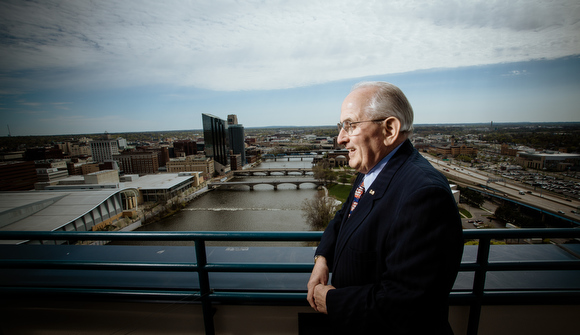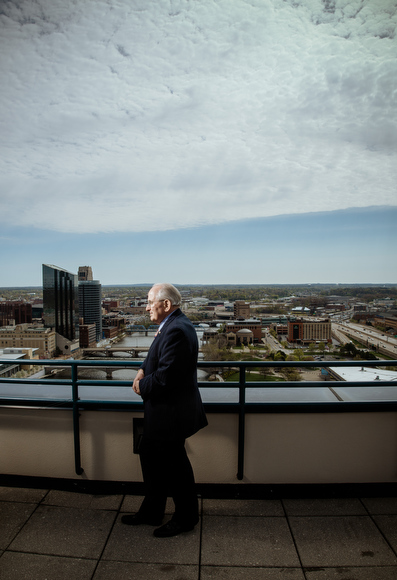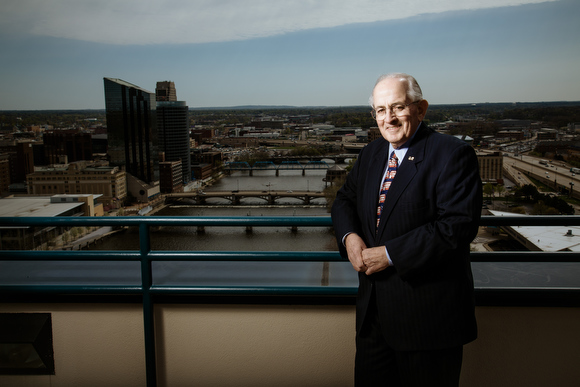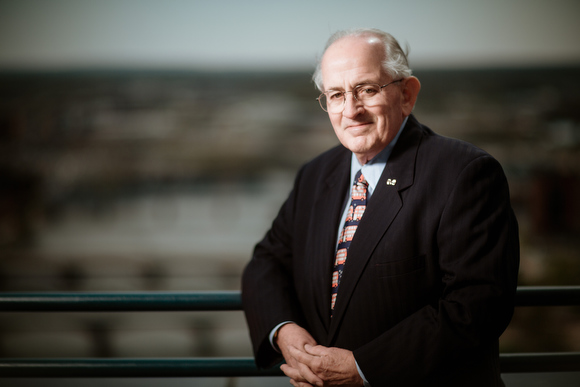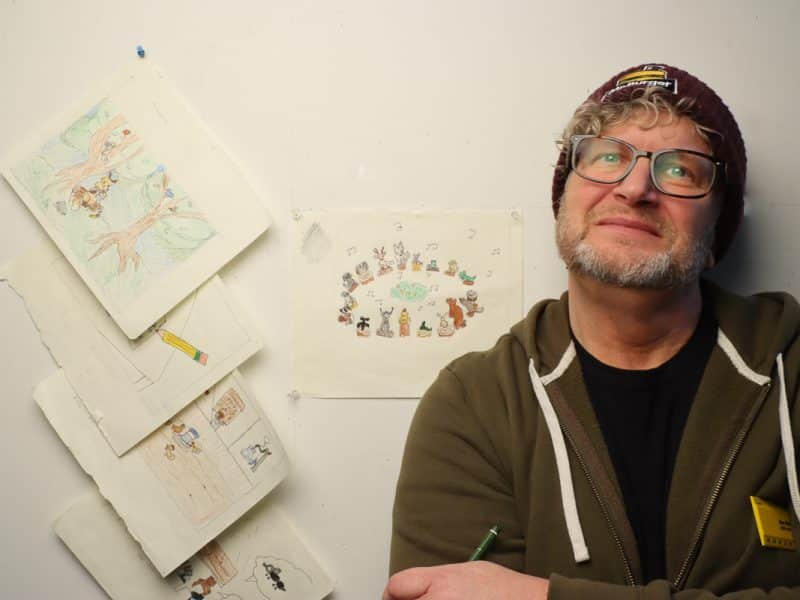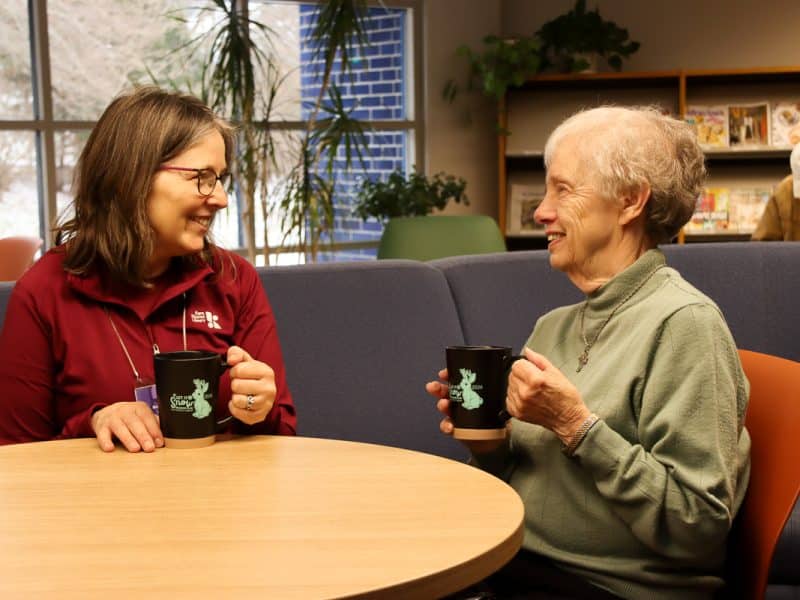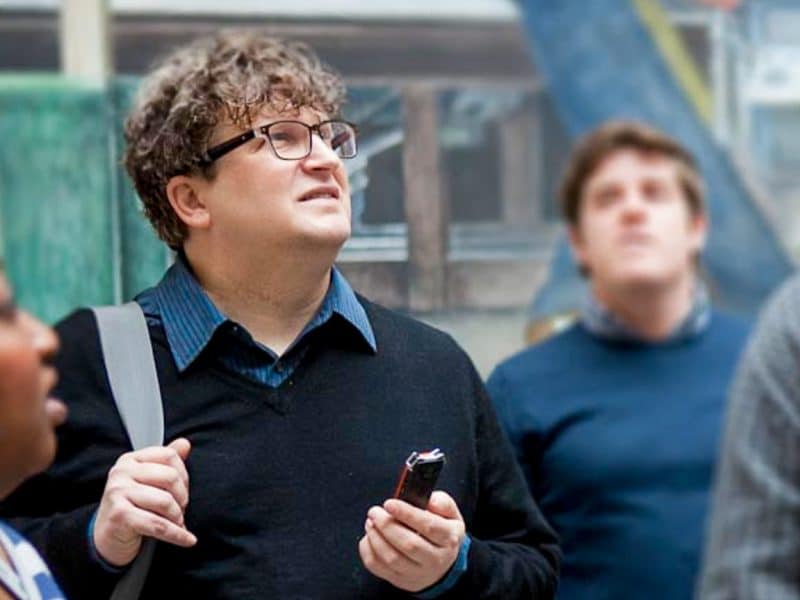A Conversation with Former Mayor Logie
Managing Editor J. Bennett Rylah has a conversation with former Mayor John H. Logie. Urban revitalization, gay rights, drugs, racism and street cars — no topic is off-limits with Grand Rapids' longest-serving Mayor.
John H. Logie was the Mayor of Grand Rapids for a long time, from 1991-2003. That’s longer than any other Mayor in the city’s 154-year history, though present Mayor Heartwell may overtake the record if he wins another term. Logie is currently a counsel attorney at Warner, Norcross, and Judd, but remains passionate about the city.
During Logie’s stint as Mayor, he was an advocate for building a vibrant downtown and maintained what could be considered progressive politics. He talks about walking down Monroe Center as a candidate, counting 74 vacant storefronts and contemplating what to do with them. He’s a fan of the layer-cake approach to building — retail on the bottom, then office space, then residential. He’s a vault of numbers, statistics, dates and information. He’s tangential when he talks, telling you seven stories just to get to the point of one, but you don’t mind, because it’s interesting and articulately executed. Anything you wanted to know about Grand Rapids, you could probably ask him.
The first time I met him in person was at the Meanwhile Bar, at a benefit for Until Love is Equal. Here, he spoke on the importance of equal rights for LGBT.
This speech was so interesting, to me, at least, that I wanted to talk to him about his endorsement for the decriminalization of marijuana. The campaign for Decriminalize GR has until August 6 to gather 6,500 signatures from city residents. This ballot initiative based on similar legislature passed in Ann Arbor in 1974 seeks to decriminalize small amounts of marijuana in the city of Grand Rapids, changing this charge into a civil infraction, rather than a crime. With $2.5 million spent in Grand Rapids the last year alone on users who were caught with less than an ounce of marijuana, supporters of DCGR claim that this is a smarter way. And Logie, at 73, was one of the group’s first supporters. When I tell him this is what I want to talk about and remind him where we met, he says, without a pause, that he’s been a proponent for gay rights since 1993 and for marijuana since 1997.
In 1997, Logie talked about the War on Drugs in his State of the City address. “One definition of insanity is doing the same thing over and over,” he says now. “But that has been at the heart of our drug policy. We now spend $200 billion a year in the War on Drugs. One of the nice rhetorical questions is, ‘How is that working?’ And the answer is, ‘Not worth a damn.'”
In his speech over a decade ago, Logie asked for volunteers who would be interested in serving on a commission for policy and recommendation to address the issue. He was thinking he’d get maybe 20 volunteers, but after a few weeks, he had over 100. He had everything from active and former users to judges, and he wanted to use them all. Having served five years in the military, it made sense to him to split them into three “companies” of 33.
They successfully changed a law that required mandatory sentencing for those carrying “one more ounce than some other number,” claiming that the mandatory sentencing made no sense.
Then, there was the free needle exchange. “[President] Clinton said that no federal money could be used for needle exchange,” Logie says. “The religious wanted to excoriate [users] for being bad drug users, but all they were doing was dying from diseases. We raised the money from the foundations and other people, and it’s going on as Clean Works.”
Clean Works ensures that those who use needles have access to clean needles, thus reducing the transmission of blood diseases such as AIDS and Hep C. In the beginning, Logie recalls, it was controversial and some only wanted the truck to be available in one certain place. Now, however, the truck is legally able to move to more places, Logie says, “to get the product to the people where they are.”
Logie says he believes that politicians and community activists have to be willing to take risks and try things, and hopefully make only small mistakes that you are able to learn from. “People who have never had the chance to serve in government are losing the courage,” Logie says. “The most pervasive reason why people say no [to change] is either a) they don’t know anything about it or even if they know something, b) they’re afraid of it without ever really investigating.”
Logie quotes British Prime Minister Benjamin Disraeli who said, “People prefer a familiar problem to an unfamiliar solution.” If you don’t like something, Logie says you have to tell him why. And if the truth is someone is scared or ignorant of an issue, they won’t admit that, so they’ll give you what Logie calls “bullshit.” This same statement applies just as much to decriminalization as another idea he’s passionate about — getting electric street cars downtown. “We could do it if we wanted to do it because they did it here 100 year ago,” he reminds me.
Logie says he believes government decisions should be made on scientific truth, and that he’s not a pessimist, hoping the next generation will learn from the shortcomings of the prior one. His love and hope for Grand Rapids is still just as strong as it was when he held office, and surveying the current downtown landscape compared to the vapid one he remembers years ago, one might think he’d be proud of his contribution to the city’s recent history. But when asked if there’s anything he would go back and change, anything he wishes he had handled differently, he says without hesitation, “Racism.”
Logie’s mother died when he was 13 years old and he was raised by his family’s African American housekeeper, Helena. Prior to his mother’s passing, she’d been sick and unable to care for her own children. It was Helena that took care of him as a boy. Logie went to a school he describes as “lily white,” saying the only two black children were the children of the Bissell family’s servants. Whenever anyone spoke of race as “us and them,” Logie could not place the woman he considered a mother in the “them” category. Despite a lack of diversity in his school environment, he feels blessed by those experiences to help him understand and combat white privilege. Helena passed away in the 90s, and Logie tears up to remember her funeral.
“Racism is endemic in this country, but it’s at its worst in big cities,” he says. “It is so pervasive and costs us so much money and lost time. If we could just find a way to not judge people when meeting them and denigrating them because of their color…” He pauses and says the hardest part about solving racism is that you’re talking about changing peoples’ hearts and minds, and some of the most radical segregationists don’t even think they’re exhibiting racist behavior. “They’ve used their power, money and prestige to isolate themselves as much as possible.”
Logie continues to be a powerful voice in Grand Rapids politics and an active community member. He continues to use his skills as a lawyer to impact current political policy, and maintains an opinionated passion in the city he loves. He will tell you he’s proud to live in a “diverse neighborhood,” and will tell you the history of every building near his home on Cherry Street, where he lives with his wife Susan. He says she’s just as beautiful today as the day he met her.
J. Bennett Rylah is the Managing Editor of Rapid Growth Media.
PHOTOS:
John Logie is the former mayor of Grand Rapids.
Photography by ADAM BIRD

